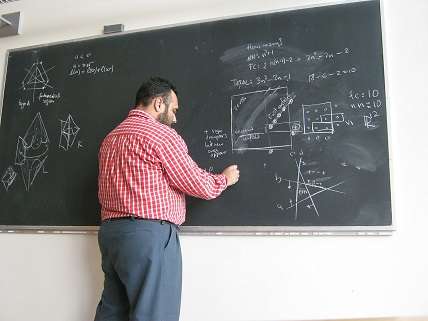Paying Teachers According to Seniority is Nonsensical and Ineffective
Paying teachers according to their degree attainment is also silly.


So argues a recently released study by The New Teacher Project. According to The Huffington Post:
The report, titled "Shortchanged: The Hidden Costs of Lockstep Teacher Pay," says the "lockstep pay" system of most school districts gives all teachers the same pay increases, regardless of performance. The report contends effective teachers should be rewarded, especially in high-poverty districts that pose the greatest teaching challenges. It estimates that U.S. school districts spend at least $250 million a year on automatic pay raises for ineffective teachers.
"Beginning salaries have to be high, one because it's fair and new entrants are not going to consider a profession with low starting salaries," Tim Daly, TNTP president, said over the phone. "The second thing is we need to accelerate salary growth for early top performers. In other careers people often start at a moderate salary, but top performances accelerate quickly because they get promoted."
The study essentially finds that "lockstep pay"—automatic yearly salary raises given to all teachers regardless of merit—incentivizes bad teachers to stay in the field (since their raises are unconditional) and drives away good teachers (since their efforts go unrewarded).
Paying teachers according to their degree attainment is also ineffective, the study finds:
Last year alone, schools across the country spent an estimated $8.5 billion on raises for teachers due to master's degrees—enough to cover the cost of all school nutrition programs for more than 15 million students. When teachers earn a master's degree or a PhD, they move into a new "lane" on the salary scale, which translates into thousands of extra dollars in salary every year for the rest of their career. In fact, teachers who pay $25,000 for a master's degree today and remain in the profession for 20 years could expect to triple their investment. Not surprisingly, 56 percent of all teachers have master's degrees.
However, there is mounting evidence that this massive investment in advanced degrees is wildly disproportionate to its actual impact on the quality of instruction in classrooms. Over the last several decades, studies have found that advanced degrees have little to no measurable effect on a teacher's ability to help students learn. In some cases, advanced degrees may even have a negative effect.
Teachers union leaders will likely condemn the study—they remain stubborn defenders of lockstep pay—but perhaps it can provide ammunition for good teachers whose hard work deserves a logical pay system.
For more coverage of teacher pay, watch ReasonTV's "The Two-Million-Dollar Teacher."


Show Comments (22)